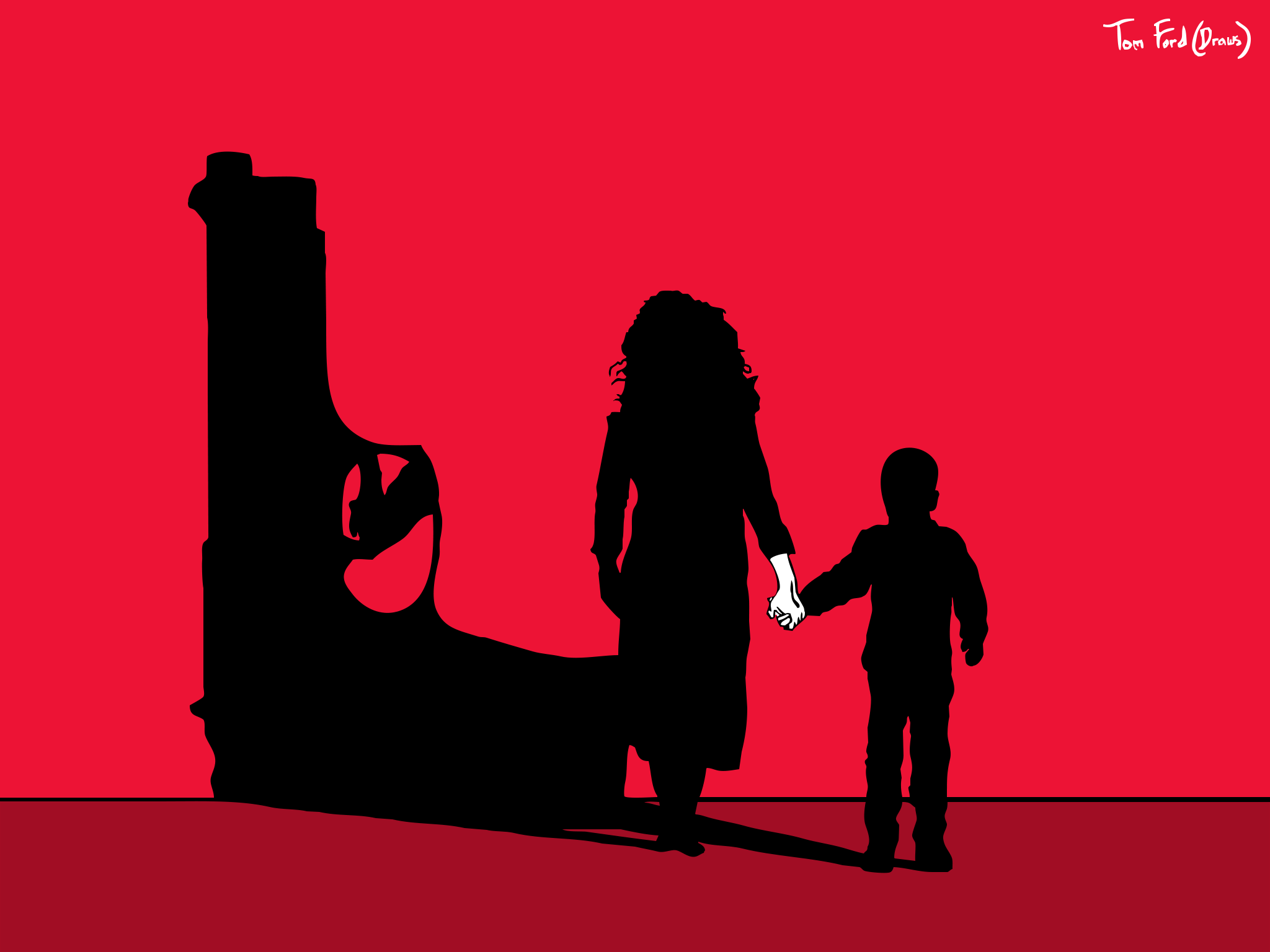Forgotten Women: One woman’s tale of America’s relationship between domestic abuse and gun violence
As Thomas knelt beside his son, still pointing a gun at Kate, the four-year-old said: ‘Don’t do it Daddy. Don’t shoot Mummy’


Gun violence in the United States has become so destructive and all-encompassing Amnesty International have branded it a human rights crisis.
Despite 80 per cent of all gun deaths in the world taking place in America and 30,000 adults and children dying every year in the nation, Congress has done little in recent years. With gun control a divisive issue that some fear to touch due to voter backlash and the right to bear arms enshrined in the second amendment, the government has been quiet. Zero gun control laws have been passed in congress in the last three years.
“The sheer volume of people killed or injured each year in the USA by gun violence is staggering. Our government has allowed gun violence to become a human rights crisis,” the Amnesty report claims.
There is a particularly vulnerable group too often left out of conversations over gun control: victims of domestic violence.
Violence in the home is a global crisis, but is exacerbated in the US due to firearms ownership, with female victims of abuse disproportionately affected by incidents involving firearms.
Gun control and domestic abuse are two topics shrouded in misinformation and stereotypes – so women who live and breathe the statistics are looking to make sure their voices are heard in one of America's biggest debates.
Kate Ranta is a single mother who’s ex-husband, Thomas Maffei, is in prison serving a 60 year sentence.
After meeting in 2007 on a dating website, the beginning of their relationship was a “whirlwind romance”. Kate, 46, said: “We were engaged within three months, and married three months after that, and I also got pregnant. So the relationship itself moved along really quickly, far too quickly.” Kate and her son, Henry, soon moved in with the air force veteran and before long she had another son, William.
Just as fast as their relationship progressed, cracks started to appear.
“The emotional abuse started pretty quickly,” Kate said. “Growing up, I thought abuse was physical – or maybe if someone calls you names that’s bad too – but nobody at that point was really talking about other types of abuse, and the power abusive men hold over women.”
In a trajectory similar to many domestic violence cases, Thomas began to take control over various elements of Kate’s life. She claims he forbade her from using Facebook out of fear of her contacting ex-boyfriends, he would scour her emails, and “eroded” the friendly relationship she had with the father of her eldest son.
“When these things were increasingly happening, I found myself in this tornado. I just couldn’t rein it in. I didn’t really know what was going on and I didn’t understand what was really happening.
“He would pick apart my physical looks, embarrassing and uncomfortable things, private things, and deliver it in such a nonchalant, seemingly jokey way.
“He had to sleep with the door closed, air conditioner on, and I couldn’t hear my son and I had always slept with the door open before. It was lots of things like that, seemingly small that shouldn’t be a big deal – but they are.”
After living a fairly isolated existence on a military base in Virginia, the family moved to Parkland, Florida in 2010. It was here that Thomas “unravelled”.
After arguing with Kate, Thomas took their youngest son William – who was two years old at the time – and tried to drive away. A terrified Kate managed to get in the car with them.
“I was on the phone with the police, crying, screaming at him to just leave the baby out of it. He raised his fist and said ‘I’ll punch you in the f***ing face if you don’t get out of this f***ing car right now.’ So I did.”
Kate ran back to the house to find Thomas had beat her to it, as had the police. He had put the baby back in its cot and was “cool and calm”.
“He was there buddying up with the cops. And I’d run a block and a half and was hysterically crying. I could see the way they were all looking at me, the police clearly thought something was wrong with me. But one cop pulled me aside and said ‘look I’ve been doing this a long time, and if he didn’t hit you this time – he will next time. Go get a restraining order.”
Kate took heed of the advice and was granted a temporary restraining order the next day. But this event sparked 18 months of harassment; stalking, vandalizing her car, breaking into her home. Multiple times Thomas did this yet still Kate was not granted a permanent restraining order, meaning her ex could buy firearms.
“As a member of the military, and a hunter when he was younger, he had two big shotguns and several handguns. When I got the temporary restraining order, the police in Parkland were able to take the guns out of the home. But an officer did say to my dad and me, ‘we can take the guns out of there but he can go out tomorrow and get another one.’
“I did what people tell women in these relationships to do, ‘just leave’, but I was in even more danger and things were worse when I got out, because all the systems that were in place to supposedly help you had failed miserably. I was definitely not safe after I left him.”
On 2 November 2012, Thomas stalked Kate back to her new home in Coral Springs, Florida. She had not given him her address.
“My father was with me at the apartment, and my ex appeared with a gun. My dad and I were pushing against the door trying to lock it on the other side, and he shot through the door three times. Then he came in and shot a couple more times. One went through my right hand, and another went through my left breast. It just missed my heart. My dad was hit in his left arm which is still disabled to this day, and he also shot my dad point blank on the left side, also just missing his heart and lung. This was all in front of my four-year-old son.”
As Thomas knelt beside his son, still pointing a gun at Kate, William said: “Don’t do it Daddy. Don’t shoot Mummy.”
After years of waiting for a trial, Thomas Maffei was found guilty in 2017 and sentenced to 60 years in prison for the attempted murder of Kate and Robert Ranta. Only after she had been shot was Kate granted a permanent protection order.
“Yes we all got out, we all lived, it’s a miracle that we’re all here, but it was preventable and never should have happened.
“So many people think ‘I wouldn’t get into that situation, if that had been me I would have done this, or I’d have had a gun too and shot him dead.’ But these ridiculous statements that people make, they have no idea what they’re talking about. You really don’t know until you’re in it.”
All three family members present for the shooting have been diagnosed with complex PTSD, with Kate missing a large amount of work and her father, Robert, living with a disability from the gunshot to his arm.
“I’ve heard so many times ‘oh he could’ve used a knife,’ and I’m like yeah but against a gun you’re completely powerless,” Kate said. “Even if I’d had one of my own, this was an ambush, these things happen so quickly, your brain completely shuts down and goes into denial.
“There aren’t that many people who can speak from personal experience like this because most of them die when there’s a gun involved – especially women.”
The Bureau of Alcohol Tobacco, Firearms and Explosives (ATF) recognises Misdemeanour Crimes of Domestic Violence (MCDV) and has put prohibitions in place, for example a person who has been convicted in any court of a qualifying MCDV “generally are prohibited under federal law of owning a firearm”.
But it seems such prohibitions are littered with loopholes.
Jasmeet Sidhu, one of those who compiled the Amnesty International report, explained: “At a federal level, the way that intimate partner is defined doesn’t really encompass the full reality of the types of relationships people are in in the United States. And it also doesn’t provide context for LGBT+ individuals, so a lot of people refer to it as the ‘boyfriend loophole’.” This can make the difficult process of getting protection orders even more difficult, as Kate found.
As well as a lack of nuanced understanding of different relationship types, the Violent Crime Control and Law Enforcement Act of 1994 does not include the misdemeanour crime of stalking as an offence that prohibits offenders from possessing firearms.
“Women are often harmed by someone they already knew, so in situations in which there is some level of stalking, not being able to seek protection is problematic, and that person still being able to access firearms in those circumstances,” Jasmeet said. She also pointed to lack of background checks for purchasing firearms as a major issue that needs to be addressed.
After extensive research on a topic woefully lacking in data, Jasmeet and the team at Amnesty found that if there is a gun present in a household where domestic violence happens, the chance of someone being injured is significantly increased.
“Every individual has the right to live and the right to be safe ... There should be more policies in place to make sure that firearms are not accessed by individuals who are likely to misuse them and currently those policies aren’t in place ... We need to look into how that impacts society as a whole.”
Kate and her family are still recovering from the trauma of six years ago, but there is hope in their future.
“Since the shooting, my son William has seen me rise up and speak up, and I think that he is starting to find his own voice, and become empowered as a result. He’s super compassionate, he’s funny, he’s smart, he’s everything that I could’ve wished for coming out of this. It could’ve gone many, many ways, but he’s been surrounded by love and support, and I know that has helped him ... Now we have this strong bond that can never be broken.
“Women have got to trust their guts and their hearts more often than they do. We’re taught to flush our intuitive feelings away and write them off ... We’ve got to trust ourselves more often than we do, and when we see something that’s off, we run, and don’t write off those feelings. Run.”
Join our commenting forum
Join thought-provoking conversations, follow other Independent readers and see their replies
Comments